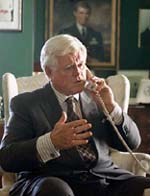
|
Human Rights Campaign
LLEEA enjoys strong bipartisan support in the Senate with 49 original co-sponsors, and is endorsed by more than 175 law enforcement, civil rights, civic and religious organizations, including: the National Sheriffs' Association, International Association of Chiefs of Police, U.S. Conference of Mayors, Federal Law Enforcement Officers Association and many others. LLEEA has already passed the Senate in earlier forms on two different occasions - most recently, in June 2000, as an amendment to the Department of Defense authorization bill, by a Senate vote of 57-42, with 13 Republicans. In September 2000, the House also passed a motion to instruct in support of the measure, 232-192, with 41 Republicans. The Senate also passed the legislation in July 1999, as an amendment to the Commerce, Justice, State (CJS) appropriations bill. Each time the amendment was stripped out in conference committee.
"Hate crimes in this country are on the rise, and gay, lesbian, bisexual and transgender Americans are all too frequently targeted for violence based in discrimination and prejudice. It is time for this country to take a stand against those that would use violence to silence the voices or spirit of any American out of prejudice. It is time for Congress to pass LLEEA," said Stachelberg. On February 22, 2001, Kyle Skyock, a slightly built 16-year-old, was found unconscious by a jogger on the side of the road after being beaten by four teen-age boys because they thought he was gay. After the incident, one of the alleged perpetrators reportedly bragged on the school bus that he had beaten up a "fag." Police refused to even interview Skyock for several months after the attack, and charges were never filed against the perpetrators. Skyock's family filed a civil suit against the perpetrators and in March 2003, a federal judge said the attack on Skyock was a "damnable" hate crime and awarded him $1.22 million in damages "Kyle Skyock and his family have found justice in the civil courts, but they most likely will never see criminal charges brought against the four teen-agers who committed this malicious crime," said Stachelberg. "LLEEA is designed to give federal authorities jurisdiction to intervene and support local authorities in cases like this to ensure that hate crimes are investigated and prosecuted to the fullest extent of the law." |
 Sen. Edward Kennedy is one of the co-sponsors of a new bipartisan anti-hate crimes bill
Sen. Edward Kennedy is one of the co-sponsors of a new bipartisan anti-hate crimes bill  Human Rights Campaign's Political Director Winnie Statchelberg
Human Rights Campaign's Political Director Winnie Statchelberg